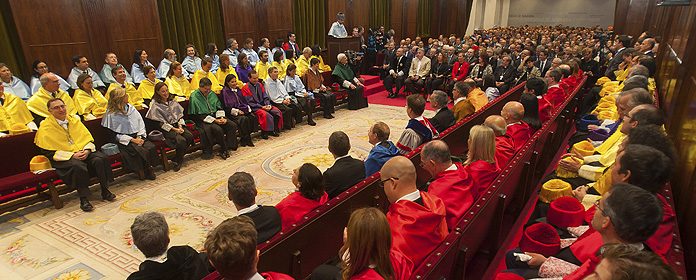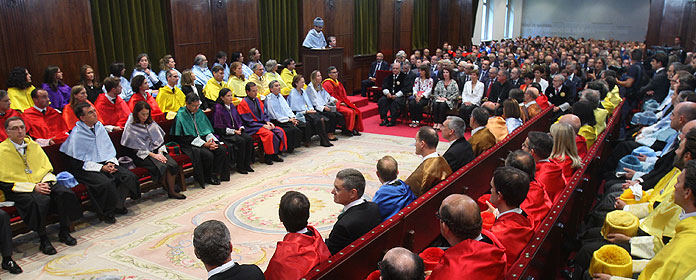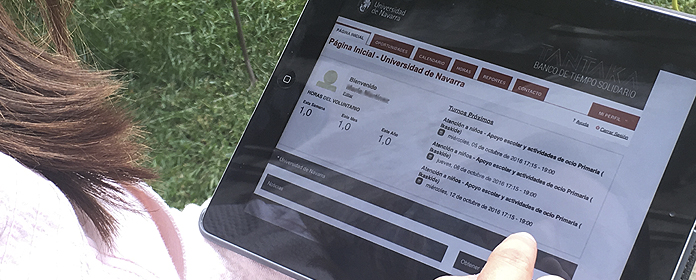Alfonso Sánchez-Tabernero: "We hope that the campus of Madrid will strengthen the University of Navarra".
The University launches a scholarship campaign for students from Navarre with financial aid of the alumni

"We intend for the campus in Madrid to strengthen the presence of the University in Navarra," said the President of the University of Navarra during the official opening of the academic year 2017-2018. Alfonso Sánchez-Tabernero thus referred to the upcoming inauguration of the Clinic's new headquarters and the postgraduate program building in the capital.
"Both the activity of the Clinic, which will begin in a few weeks, and the master's degrees and other programs offered at the Madrid campus will make the University better known and appreciated," he said. "We are confident that this fact will mean that more people will want to come to Pamplona to study, to do research and to receive attendance healthcare."
This is "the year of Madrid" for the University, he said, but at the same time, he expects to see an increase in activity in Navarra, as well as at campus in Barcelona and San Sebastián. "We are comfortable in all these places - and also in New York, Munich and Sao Paulo - where IESE, the University's business school, has other campuses.
Regarding the University's relationship with the Government of Navarre, he predicted a good understanding. "There are several reasons that lead me to think so. Firstly, in recent years we have learned that we all waste too much time and too much energy with disputes; secondly, we have seen that together we can promote projects that are very useful for society, as happened a few months ago with the start of Idisna, the high school of research Sanitaria de Navarra", he pointed out.
He also highlighted the attitude of orientation to agreement of the President of the Government, "who shares this determination to seek friendly solutions to any conflict that may arise". And he trusted that the things that unite the two institutions will be "an effective lever to overcome the obstacles that still remain, such as the scholarship policy".
95 million to projects of researchThe President of the University of Navarra spoke in its speech of "the research frontier" as one of the priority challenges for the University. The Schools, schools and the six centers of research (CIMA, CEITICS, ICS, IST, CIN and Center for Bioengineering) are producing more and more science: "Their researchers are publishing more articles in high impact journals, filing more patents, conducting more clinical trials and obtaining more competitive funding".
Last year, he said, the University of Navarra allocated 95 million euros to research projects financed with public and private funds. "After years of crisis, public administrations, and specifically the Government of Navarra, are increasing their commitment to research with new calls for proposals. And we are confident that the Science Law that is being prepared will come into force soon," he said.
Growth in the number of requests for Admissions Office and the international outreachAlfonso Sánchez-Tabernero underscored the University of Navarra's efforts to place students at the center of gravity of university life. "That is why I often repeat that those of us who work at the University of Navarra must consider what more we can do to make this one of the best places in the world to study."
"This commitment on the part of all has led to an increase in the number of applications for Admissions Office in recent years, especially from students from other countries. Thus, in the current academic year, 25% of the new students enrolled in Degree are international students and the figure exceeds 40% in the programs Master's Degree and 30% in the programs programs of study of doctorate".
In addition, the University of Navarra continues to occupy outstanding positions in international rankings, as highlighted by President, such as the recently published QS Employability Ranking, which places it among the top 50 universities in the world in terms of student employability.
Professor Sánchez-Tabernero summarized some of the highlights of the 2016-2017 academic year, including the death of Javier Echevarría, Chancellor for the past 22 years, and the appointment of Fernando Ocáriz as his successor; as well as the award of the Once Navarra Foundation to Tantaka for its solidarity action; the expansion of the offer of Degrees and masters; or the increased role of the Art Museum as the cultural hub of campus, among others.
Regarding the events planned for the next academic year, he highlighted the 25th anniversary of Alumni, the group of graduates, and the 50th anniversary of School of Theology, through whose classrooms more than 4,700 students have passed.
He also referred to the signature of the Pact for Coexistence, endorsed by many other Spanish universities, which aims to promote understanding, peace and reconciliation; and helps to prevent the violent radicalization of society: "Radicals always want the disappearance of those who are not like them, of those who do not think like them. In the face of these exclusionary attitudes, in the universities we teach that the variety of points of view brings cultural richness; that the opinions of others must be listened to with respect; that we always have something to learn from our interlocutors".
Inaugural lecture on the first Code of Canon LawAfter a Eucharistic concelebration, presided by the Archbishop of Pamplona and Bishop of Tudela, Francisco Pérez, the academic ceremony began with the parade of the procession to classroom Magna, in which more than 230 PhDs participated, and the subsequent reading of the summary of last year's report , at position of University Secretary, Gonzalo Robles.
Afterwards, Valentín Gómez-Iglesias, professor at School of Canon Law, gave the inaugural lecture "From the centrality of the law to the primacy of the person in the law of the Church. History and canonical perspectives in the centenary of the 1917 Code". In it the professor sample how the first Code of Canon Law assigned the central place in the Law of the Church to the Law and the Legislator; and how little by little that centrality was yielding the primacy to the person and his fundamental rights and duties, "thanks also to the balanced scientific contribution, integrating and at the same time irreplaceable, of some professors of the University of Navarra".
The musical part of the event was performed by the choir of the University of Navarra, directed by Ekhi Ocaña, at position . Among the authorities who attended the event were the president of the Government of Navarra, Uxue Barkos; the president of the Parliament of Navarra, Ainhoa Aznárez; the delegate of the Government, Carmen Alba; the mayor of Pamplona, Joseba Asiron; the president of the High Court of Justice of Navarra, Joaquín Galve; the counselor of Education, María Solana; and the chief prosecutor of the High Court of Justice of Navarra, José Antonio Sánchez Sánchez-Villares.
Also in attendance, among other guests, were the second vice-president of the Parliament, Alberto Catalán; the vice-president of development Económico del Gobierno de Navarra, Manuel Ayerdi; the councilor of Culture, Ana Herrera; the second secretary of the Bureau of the Parliament of Navarra, Oscar Arizcuren; the Ombudsman of Navarre, Javier Enériz; the president of the Chamber of Comptos, Asunción Olaechea; the president of committee of Navarre, Alfredo Irujo; the President of the UPNA, Alfonso Carlosena; and the director of the associated center of the UNED in Pamplona, Carmen Jusué.


